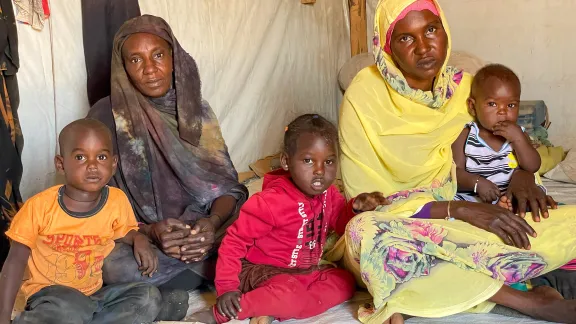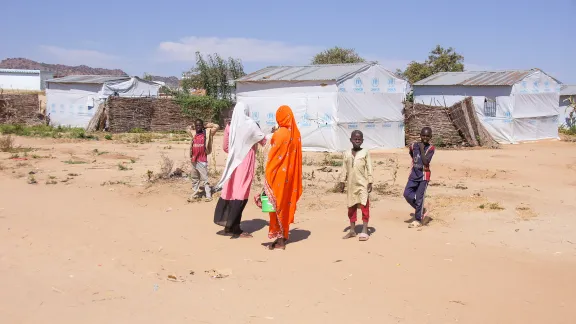
"I have seen the worst”: Nawala Ateib Mahamat (yellow dress) with her sister and their children in their home in the refugee camp. Photo: LWF/ C. Kästner-Meyer
LWF provides relief goods, water, and sanitation in eastern Chad
(LWI) -” We want security and peace”! The women who sit under a tree in Adré, Chad, are visibly exhausted. They arrived in the morning from Darfur, Sudan, after days of travel on foot. Their children listlessly sit next to them. Aziza Harun from Al Geneina lost her husband, a brother-in-law, and a grandfather in the conflict that has been raging in Sudan since April 2023. Other women in the group came from Fashir and traveled at night to avoid being attacked on the road. On a morning in December 2024, they crossed the border into Chad.
Aziza Harun, her family, and her companions are some of the more than 3 million people who have fled the violence in Sudan since its last escalation. Over 700,000 have come to Chad and found shelter in the dozens of refugee camps in the country’s eastern provinces. Many of them are women and children, or elderly people. Host communities and aid organizations struggle to shelter and feed the hundreds of thousands who arrive often only with the clothes they are wearing, and harrowing memories of violence and death.

Arkoum refugee camp, where LWF works. Photo: LWF/ C. Kästner-Meyer
Access to water is one of the biggest challenges, along with sanitation.
– Faba DJONDANG, LWF area coordinator for Sila and Ouaddaï provinces
Underfunded response
LWF Chad has been active in eastern Chad long before the latest conflict, providing critical aid alongside local partners. They’ve installed water and sanitation systems, distributed food and relief items, and built emergency shelters for those forced to sleep in the open upon arrival. Yet, the needs far outweigh the resources.
“People in the camps face incredibly difficult circumstances,” says Faba Djondang, LWF Area Coordinator for Sila and Ouaddaï. “Access to water is one of the biggest challenges, along with sanitation.” In Arkoum refugee camp, LWF has managed to install 55 latrines for 50,000 people—an inadequate solution given the sheer numbers.
The response to the Sudanese refugee crisis remains severely underfunded. According to the United Nations High Commissioner for Refugees, only 30 percent of the money that is needed to feed, shelter, and support the people displaced through the Sudan conflict has so far been made available. The 700,000 refugees in Eastern Chad are hosted by communities who live in extreme poverty themselves. In the border provinces, the roads are usually not paved, electricity comes from generators and solar panels, and water is scarce.
Delicate balance
The influx of refugees has disrupted the already fragile balance in host communities. “Take the issue of firewood,” Djondang explains. “The law in Chad forbids cutting trees for firewood, but for many refugees, it’s the only livelihood. This creates conflicts—not only with host communities but also among refugees, as there’s not enough to go around.”
Fatouma Yahoub, who has been living in the Arkoum refugee camp since May 2023, adds the details: “When women collect firewood, we are beaten up, and sometimes raped,” she says. “The food rations we receive for a month aren’t enough. I have seven children; what we get lasts barely a week. It has been three months since the last distribution.”
In Arkoum, most people live in makeshift shelters of tarpaulin, plywood, and straw, offering little protection against the scorching summer sun or cold nights. “I only have the clothes I arrived with,” says Aza Shahadin. “Please, at least give us pullovers for the children!”
Long-term solution needed
“It is very difficult to find assistance,” says Adam Abdallah Abdalrahman, president of the refugee community at the Adré transit camp and member of the refugee community leadership. “The food distributions are not enough”. He says women and children often work in fields or markets to supplement their families' meager resources, leaving them vulnerable to gender-based violence. Others collect firewood to sell or take on debt. Some families claim their young men have left to cross the Mediterranean, for a better life.
LWF continues to provide emergency relief, distributing items like mats, blankets, cooking utensils, and buckets. However, Djondang emphasizes the need for sustainable solutions: “We must help refugees build livelihoods. Some refugees who fled Sudan in 2003 have now integrated into local communities. That’s what we need to aim for.”
Many refugees are desperate for help, as they have nowhere to go anymore. Their homes and communities have been destroyed. “We hid under the beds” Nawala Ateib Mahamat, a female refugee leader in Farchana, recalls. “We saw death. They were killing innocent people. I am never going back to Sudan, I have seen the worst”.


